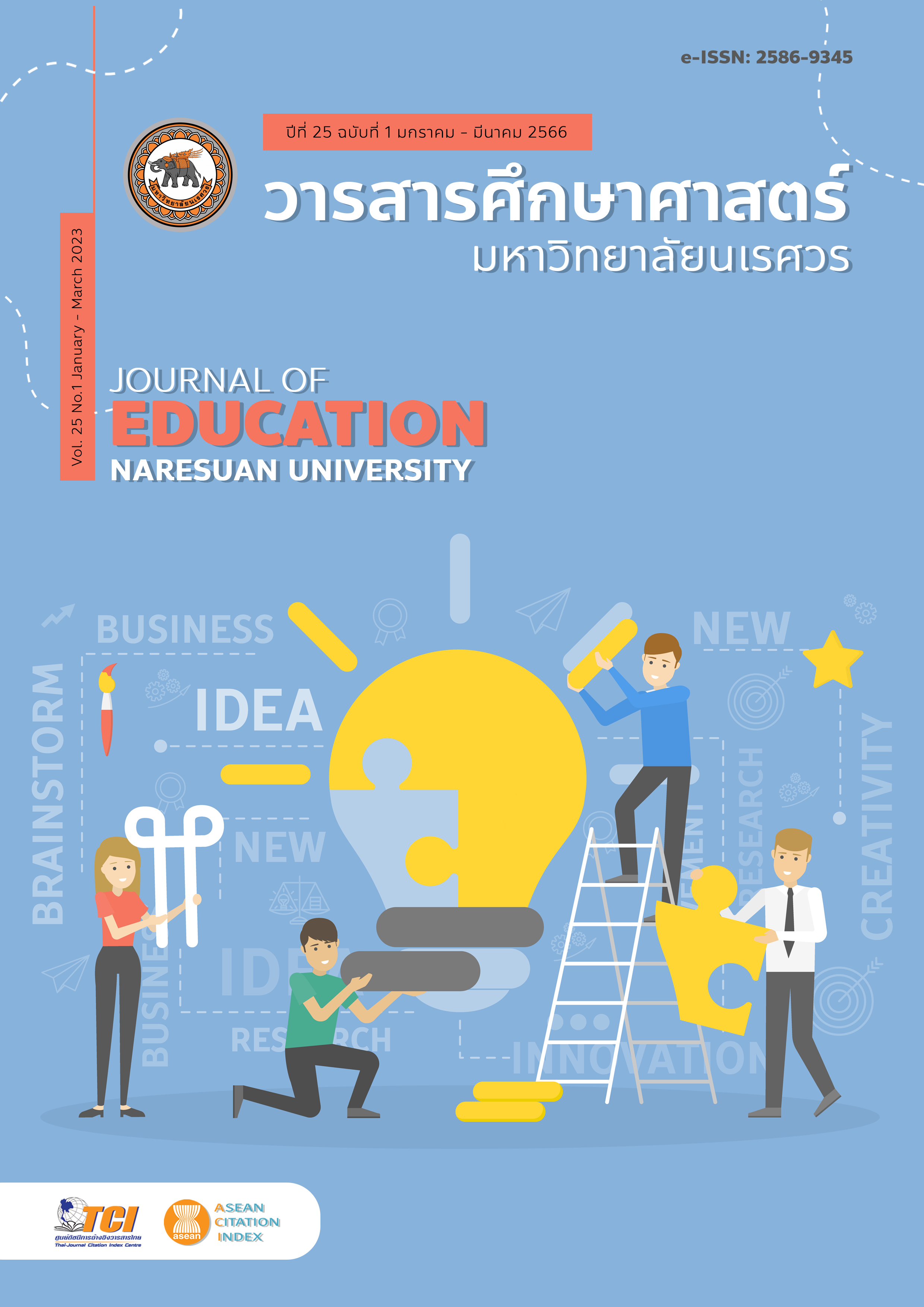DEVELOPING SCIENTIFIC EXPLANATION ABILITY OF BIOLOGY STUDENT TEACHERS BY PROVIDING EXPERIENCES IN GENERATING SCIENTIFIC EVIDENCES AND WRITING SCIENTIFIC EXPLANATIONS การพัฒนาความสามารถในการอธิบายทางวิทยาศาสตร์ของนักศึกษาครูชีววิทยา โดยการจัดประสบการณ์การสร้างหลักฐานทางวิทยาศาสตร์และการเขียนอธิบายทางวิทยาศาสตร์
Main Article Content
Abstract
The purpose of this research were to study the effect of providing experiences in generating and writing scientific explanations on the scientific explanation ability of biology student teachers and compare the scientific explanation ability of biology student teachers before and after learning. Providing these experiences based on an inquiry process. The instructor stated the problem situation for biology teacher students to formulate hypotheses, design experiments, collect data, analyze data and write scientific explanations. Research participants were 29 third year biology student teachers in tertiary level. The research instruments consisted of 1) an experimental record form, data were analyzed by content analysis for describing links among assumptions, experimental design, and scientific explanation and 2) scientific explanation ability test, data was checked by using the specific claim, evidence and reasoning rubrics. The data was analyzed by using arithmetic mean, standard deviation, and dependent sample t-test. The research results revealed that biology student teachers were able to design the experiments to generate evidences to support their experimental assumptions and used the evidences to create their own scientific explanations. After receiving feedback from the instructor, their scientific explanations were more complete. Data from scientific explanation ability test could be concluded that the mean score of scientific explanation after learning was significantly higher than before learning at 0.05.
Article Details

This work is licensed under a Creative Commons Attribution-NonCommercial-NoDerivatives 4.0 International License.
The owner of the article does not copy or violate any of its copyright. If any copyright infringement occurs or prosecution, in any case, the Editorial Board is not involved in all the rights to the owner of the article to be performed.
References
Aikenhead, G. S. (2004). Science-based occupations and the science curriculum: concepts of evidence. Science Education, 89(2), 242 – 275.
Bell, P., & Linn, M. (2000). Scientific arguments as learning artifacts: Designing for learning from the web with KIE. International Journal of Science Education, 22(8), 797 – 817.
Chinn, C. A., & Brewer, W. F. (1998). An empirical test of a taxonomy of responses to anomalous data in science. Journal of Research in Science Teaching, 35(6), 623 – 654.
Davies, A. (2003). Learning through assessment: Assessment for learning in the science classroom. In J. M. Atkin & J. E. Coffey (Eds.), Everyday assessment in the science classroom (pp. 13 – 26). Arlington, VA: National Science Teachers Association Press.
Duschl, R. A. (2003). Assessment of inquiry. In J. M. Atkin, & J. E. Coffey (Eds.), Everyday assessment in the science classroom (pp. 41 – 59). Washington, DC: National Science Teachers Association Press.
Kampourakis, K., Silveira, P., & Strasser, B. J. (2016). How do preservice biology teachers explain the origin of biological traits?: A philosophical analysis. Science Education, 100(6), 1124 – 1149.
Kuhn, L., & Reiser, B. (2005). Students constructing and defending evidence-based scientific explanations. Paper presented at the Annual meeting of the National Association for Research in Science Teaching, Dallas, EUA.
Macagno, F. (2016). Argument relevance and structure. Assessing and developing student’ uses of evidence. International Journal of Educational Research, 79, 180 – 194.
McNeill, K. L., Lizotte, D. J., & Krajcik, J. (2005). Identifying teacher practices that support students; explanation in science. Paper presented at the annual meeting of the American Educational Research Association, Montreal, Canada.
McNeill, K. L., & Krajcik, J. (2008). Inquiry and scientific explanations: Helping students use evidence and reasoning. In Luft, J., Bell, R. & Gess-Newsome, J. (Eds.). Science as inquiry in the secondary setting (pp. 121 – 134). Arlington, VA: National Science Teachers Association Press.
McNeill, K. L. (2011). Elementary students’ views of explanation, argumentation, and evidence, and their abilities to construct arguments over the school year. Journal of Research in Science Teaching, 48(7), 793 – 823.
McNeill, K. L., & Krajcik, J. S. (2012). Supporting grade 5 – 8 students in constructing explanation in science: The claim, evidence, and reasoning framework for talk and writing. Boston: Pearson Education.
National Research Council. (2000). Inquiry and the national science education standards. Washington, DC: National Academy Press.
OECD. (2013b). PISA 2015: Draft science framework. Paris: OECD.
Sandoval, W. A. (2003). Conceptual and epistemic aspects of students' scientific explanations. Journal of the Learning Sciences, 12(1), 5 – 51.
Sandoval, W., & Reiser, B. (2004). Explanation-driven inquiry: Integrating conceptual and epistemic scaffolds for scientific inquiry. Science Education, 88(3), 345 – 372.
Sandoval, W. A., & Millwood, K. A. (2005). The quality of students’ use of evidence in written scientific explanations. Cognition and Instruction, 23(1), 23–55.
Sesen, B. A. (2013). Diagnosing pre-service science teachers' understanding of chemistry concepts by using computer-mediated predict–observe–explain tasks. Chemistry Education Research and Practice, 14(3), 239-246.
Walton, D. (2016). Argument evaluation and evidence. Switzerland: Springer International Publishing.


